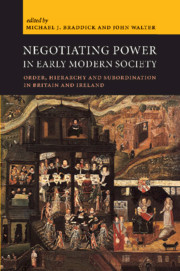Book contents
- Frontmatter
- Contents
- Notes on contributors
- Acknowledgements
- List of abbreviations and conventions
- Introduction. Grids of power: order, hierarchy and subordination in early modern society
- 1 Ordering the body: illegitimacy and female authority in seventeenth-century England
- 2 Child sexual abuse in early modern England
- 3 Sex, social relations and the law in seventeenth- and eighteenth-century London
- 4 Exhortation and entitlement: negotiating inequality in English rural communities, 1550–1650
- 5 Public transcripts, popular agency and the politics of subsistence in early modern England
- 6 ‘Bragging and daring words’: honour, property and the symbolism of the hunt in Stowe, 1590–1642
- 7 Administrative performance: the representation of political authority in early modern England
- 8 Negotiating order in early seventeenth-century Ireland
- 9 Order, orthodoxy and resistance: the ambiguous legacy of English puritanism or just how moderate was Stephen Denison?
- 10 Making orthodoxy in late Restoration England: the trials of Edmund Hickeringill, 1662–1710
- Notes
- Index
8 - Negotiating order in early seventeenth-century Ireland
Published online by Cambridge University Press: 13 March 2010
- Frontmatter
- Contents
- Notes on contributors
- Acknowledgements
- List of abbreviations and conventions
- Introduction. Grids of power: order, hierarchy and subordination in early modern society
- 1 Ordering the body: illegitimacy and female authority in seventeenth-century England
- 2 Child sexual abuse in early modern England
- 3 Sex, social relations and the law in seventeenth- and eighteenth-century London
- 4 Exhortation and entitlement: negotiating inequality in English rural communities, 1550–1650
- 5 Public transcripts, popular agency and the politics of subsistence in early modern England
- 6 ‘Bragging and daring words’: honour, property and the symbolism of the hunt in Stowe, 1590–1642
- 7 Administrative performance: the representation of political authority in early modern England
- 8 Negotiating order in early seventeenth-century Ireland
- 9 Order, orthodoxy and resistance: the ambiguous legacy of English puritanism or just how moderate was Stephen Denison?
- 10 Making orthodoxy in late Restoration England: the trials of Edmund Hickeringill, 1662–1710
- Notes
- Index
Summary
By the beginning of the eighteenth century, most Englishmen believed that over the previous two hundred years England had acquired an empire. By this they meant that English men (although a few mentioned women and children) had established colonies first in Ireland and then across the Atlantic world and that a process of social and economic convergence, which would be termed ‘Anglicisation’ by later historians, was well under way. They gave rather less attention to the mechanics which underlay this development and in particular to what happened when English models of authority, so delicately negotiated at home, were transplanted abroad. The more perceptive among the commentators noted that despite apparent social and economic convergence there were significant differences in the structures of order in the diverse parts of the ‘empire’. In particular, Ireland, close to home and with a long history of close contact with England, seemed to be strongly at variance with English norms of order despite almost two centuries of attempts to transplant English ideas of authority there. In the 1680s the earl of Anglesea, attempting to write a history of Ireland, drew attention to the divergent norms of order across the wide sphere of English influence.
- Type
- Chapter
- Information
- Negotiating Power in Early Modern SocietyOrder, Hierarchy and Subordination in Britain and Ireland, pp. 188 - 205Publisher: Cambridge University PressPrint publication year: 2001
- 3
- Cited by

